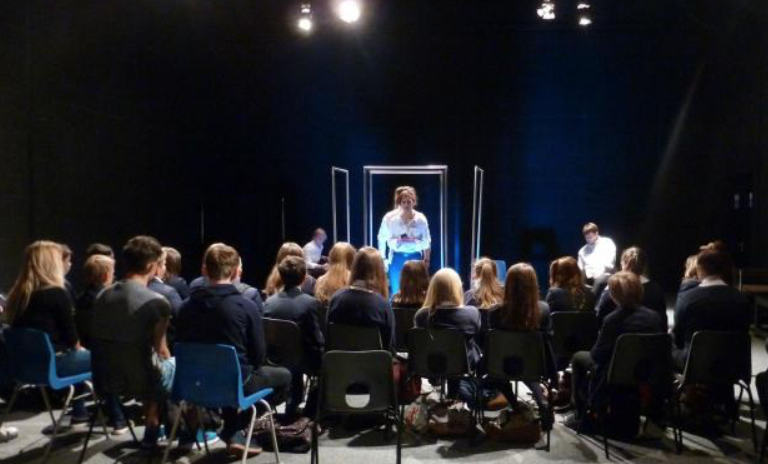In my second year at York St John, I participated in the ‘Children and Young People’ module, designed to workshop sensitive topics with students, that they may face throughout their school or home lives. The module was based around the university’s scheme, ‘It’s Not Ok’, which was created by tutors for the NSPCC, in order to raise awareness of child exploitation. The programme is easily accessible through the NSPCC website, as well as being toured around schools with a cast of students. The partnership was with a low aspirations school, with a group of pupils who were talented at drama. Our aim was to change their opinions of university, as well as expand their knowledge on theatre.
From the workshops we planned, the students were required to collaborate with us to create a short performance, as a response to the NSPCC scheme. As facilitators, we wanted the young people to be in charge of their performance, therefore each week we would plan workshops based off of their feedback from the previous week. We would have regular discussions about the storyline, the drama techniques they enjoyed and what they could represent in their performance. This allowed them to take authentic ownership of the work that they produced.
As a group of co-facilitators, we split up the physical activities to have one or two ‘main’ facilitators leading each one. The discussion-based activities were left to be co-facilitated, with everyone adding information and asking questions as necessary. Leading a group of children with activities required me to be confident and understanding. As we were dealing with such sensitive topics, it was vital that we gained their trust through empathy and patience. As a group, we agreed not to push the students into making them feel vulnerable, as “[…] the open space represents a problem; individuals feel exposed[…]” (Hahlo. 2000 p.1) The open space in this instance refers to the anxieties that a person can feel when asked to share their opinion, which we wanted to avoid. Therefore, if someone felt uncomfortable sharing work or ideas in front of the class, we may ask them on a more 1 to 1 scale, in order to get their input.

How this experience can relate to teaching.
From a co-facilitation perspective, it was important that we created a safe environment for everyone in the room. We wanted to ensure the workshops were “[…] appropriate for the youngest or most vulnerable person[…]” (NSPCC Learning 2018) Due to the sensitive nature of the topics, we were made aware of the schools’ safeguarding policy, as a volunteer in the space. Unfortunately, during our placement, we were faced with a safeguarding issue surrounding one of the characters’. We acted fast to ensure no students in the room were aware of what happened, to stop potential embarrassment or rumours. We also prevented the individual from feeling excluded, by asking her at each activity if she wanted to take part, and one member of our group sat with her for moral support. From this, we worked closely, as a group, to ensure that we stayed away from this particular character and anything that involved her in the storyline. The young people were happy for us to put this barrier into place, however they had free rein to explore the other dynamics of the piece. From this experience we began to understand why our work was so important and continued to try and make effective, yet enjoyable workshops.
Allowing the young people to (mostly) take charge of their own performance, was a positive experience for both the pupils and facilitators. The students took pride in their work and were happy to get involved during group discussions, to ask questions and suggest potential images or techniques. They began to make links between the images that they had created and the storyline of ‘It’s Not OK’, indicating their immersion within the workshops. As facilitators, we made sure to write down and trial anything that the young people envisioned, as well as adding our creative input with the techniques we introduced them to. This gave them reassurance that none of their ideas would be dismissed or forgotten about, giving them the confidence to contribute and get involved.
Bibliography
Hahlo, R and Reynolds, P. (2000) Getting Started. Dramatic Events: How to Run a Successful Workshops. New York St. Martin’s Griffin. pp. 1-7.
NSPCC Learning (2018) Safeguarding in the performing arts. Creating a safe environment. [internet] https://learning.nspcc.org.uk/safeguarding-child-protection/for-performing-arts/#article-top [accessed 25/4/2020]
York St John University (2018) Success for York St John University online safety play commissioned by NSPCC [internet] https://www.yorksj.ac.uk/news/2018/its-not-ok-play-for-nspcc-campaign/ [accessed 25/04/2020] (photo)